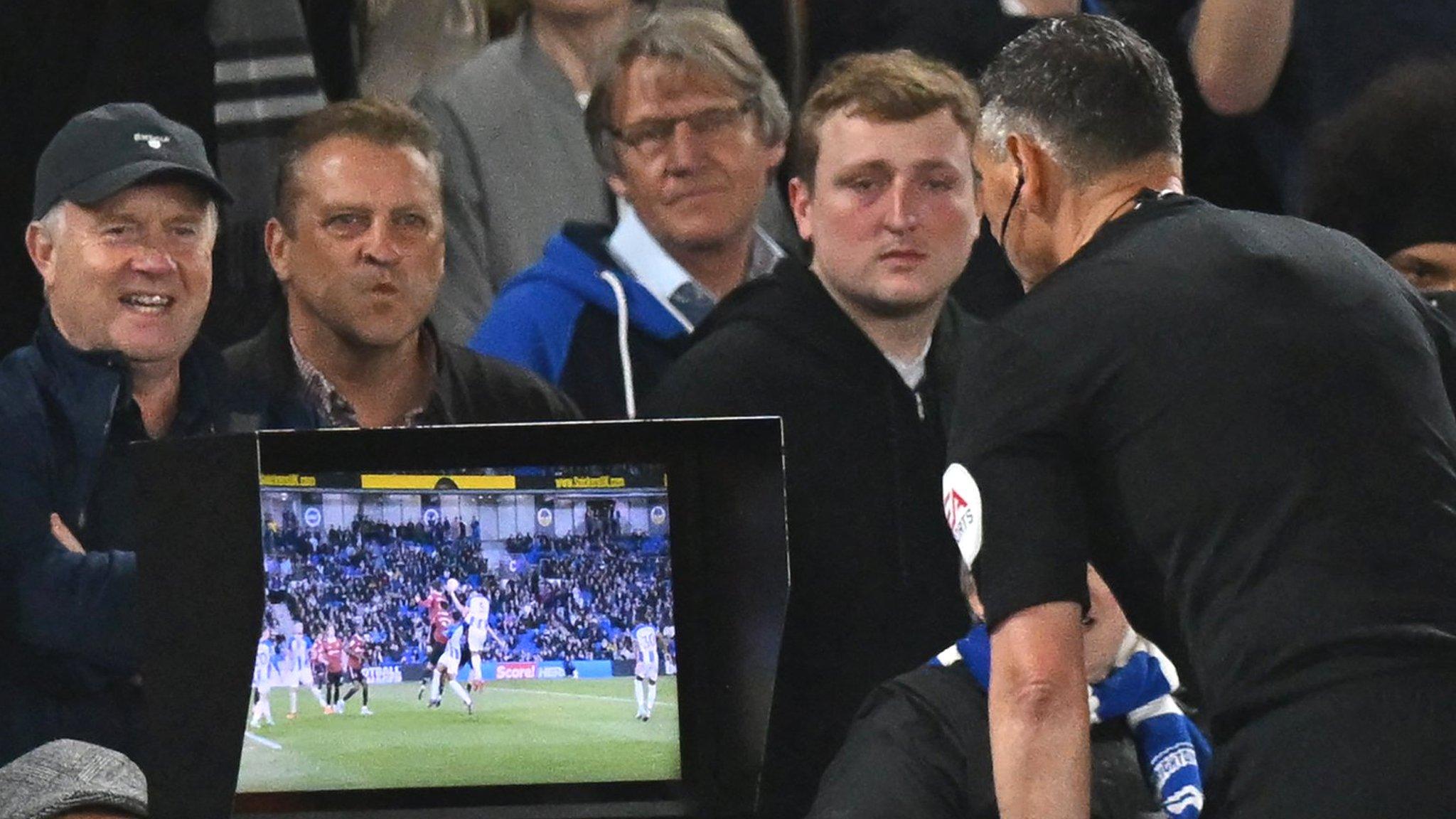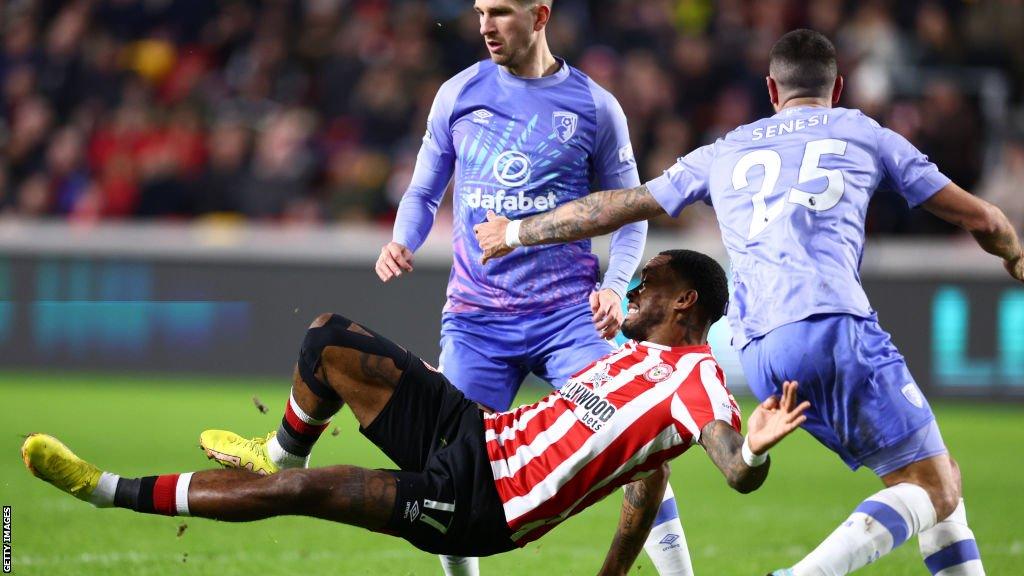VAR: Release of in-game audio 'small step forward', says referees' chief Howard Webb
- Published
- comments

Releasing audio of video assistant referee decisions is a "small step forward" in providing clarity around incidents, says referees' chief Howard Webb.
The application of VAR technology has been questioned and criticised by managers, players and pundits throughout the Premier League season.
In a bid to improve transparency, Webb appeared on Sky Sports to talk through how key decisions were reached, alongside pundits Jamie Carragher and Gary Neville.
"We're looking to do this [release audio] as much as we possibly can," Webb said on Monday Night Football.
"Tonight is obviously something new. We're making a small step forward. Going forward into next season we will look to do more of the same.
"We can't play it live, Fifa don't allow us to play it out during the game - who knows where that might go in the future - but there is nothing to stop us showing that information later."
In-game audio was released by Professional Game Match Officials Limited (PGMOL) from six matches this season, with supporters able to hear the discussions before Webb offered further insight.
Newcastle 0-2 Arsenal - VAR overturns penalty decision (7 May)
VAR: How referees make decisions
What happened?
Referee Chris Kavanagh awarded Newcastle a penalty for handball when Bruno Guimaraes' shot struck Jakub Kiwior, however VAR Michael Salisbury overturned the decision with replays showing the ball had first hit the defender's thigh before any contact with his arm.
What was the reaction at the time?
Speaking on BBC Radio 5 Live, former Liverpool defender Stephen Warnock said: "It's come off the thigh then on to the arm, it's definitely not a penalty. I don't know why the Newcastle fans are so irate."
What was discussed?
VAR Salisbury: "We are going to check the penalty for you, external... can you confirm it is definitely the arm and it's not hit the thigh first? We need to confirm it is not his thigh.
"It looks like it is thigh on to arm. So the arm is, to me, in a natural position. The ball comes off the thigh and makes a movement into that arm. I don't believe that should be a penalty kick.
"I'm going to recommend an on-field review on the penalty you have awarded. What we are showing you is the impact of the ball and the position of the arm."
On-field referee Kavanagh: "So we have a deflection off the knee first. Show me once more. The arm is close in, my initial reaction was the arm was out, so I'll restart with a drop-ball to the goalkeeper."
Webb's explanation:
"There are two things on this one. The ball clearly strikes the thigh - the shorts move - and also the arm is moving back into the body and makes the player smaller. The arm is not in the position the referee thought it was.
"I'm really keen to make sure that our use of VAR is consistent. This one is a good use of VAR because it is different to what the referee saw. There is still some case for the referee to review the decision on this one."
Chelsea 0-0 Liverpool - VAR overturns Havertz goal (4 April)
VAR: Listen to in-game audio as match officials rule out Havertz goal
What happened?
Kai Havertz had a goal ruled out for handball after VAR Kavanagh informed referee Anthony Taylor that the ball had gone in off the Chelsea forward's arm after his initial shot rebounded off goalkeeper Alisson.
What was the reaction at the time?
Speaking on BBC Radio 5 Live, former Arsenal defender Matt Upson said: "You can see on the replay he just holds his elbow up. It's a good save from Alisson really because he does stay big and it comes off Havertz's arm and ricochets back into the net."
What was discussed?
On-field referee Taylor: "On-field decision is goal because I think it hits Havertz's chest.", external
VAR Kavanagh: "It's factual. Just frame it on the arm. Right, that is clearly the arm. I recommend you disallow the goal. It is handball, leads immediately to the ball in the net. It's factual."
Webb's explanation:
"It's an opportunity for the VAR officials to see something the on-field referee couldn't. You hear Taylor say he thinks it hits the chest, but we know if it goes in off the arm it has to be disallowed.
"In this situation the referee doesn't need to see the screen because it's factual. There is no need for any other interpretation.
"Rather than waste time by sending the referee to the screen, we overturn the decision there and then and try and be as efficient as we can."
Brentford 2-0 Bournemouth - VAR fails to overturn penalty (14 January)

Howard Webb explained that VAR should have awarded a free-kick to Bournemouth but failed to analyse an earlier foul
What happened? On-field referee Jarred Gillett awarded Brentford a penalty because of a foul by Marcos Senesi on Ivan Toney, a call which was supported by VAR Marriner, despite Toney appearing to hold the defender's arm before the foul occurred.
What was the reaction at the time? Bournemouth manager Gary O'Neil called the decision to award the penalty "scandalous", adding: "I don't know how you get that wrong with VAR." But, speaking on BBC Radio 5 Live, former Wales defender James Collins said it was "a clear penalty and "very clumsy".
What was discussed?
Referee Gillett: "The second one. Holding with the arm around him and dragging him down."
VAR Marriner: "There is enough to support that. Check complete."
Webb's explanation:
"I don't think there's anything to suggest that is a clear error, but obviously we're not only checking the final action but also the phase that leads into that decision.
"In this situation we see a foul by Toney on Senesi, before Senesi puts his arm on Toney. The sequence didn't start early enough. It's a matter of process as opposed to judgement. Toney locks in and traps his arm and this should be penalised with a free-kick for Bournemouth.
"We know that long checks can cause some frustration but we're hoping that by playing these audios out you can see there's a process.
"We can't sacrifice accuracy for speed. In this case, VAR didn't thoroughly analyse the full sequence that led to that contact between Toney and Senesi. If it had, it would have shown the action by Toney and led to the penalty being overturned."

Our coverage of your Premier League club is bigger and better than ever before - follow your team and sign up for notifications in the BBC Sport app to make sure you never miss a moment
